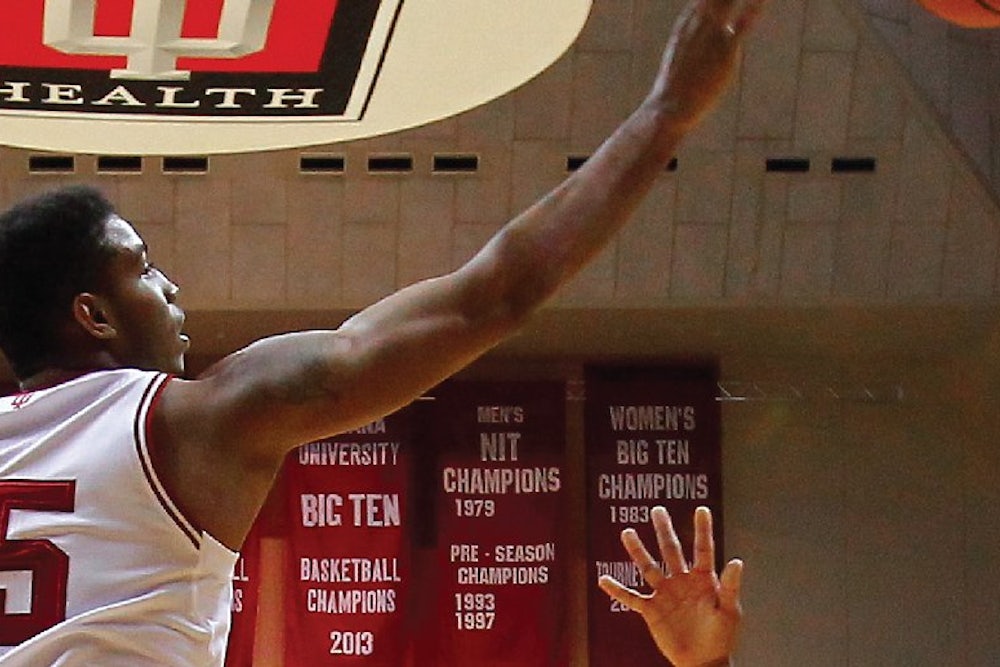On Thursday, Indiana University men's basketball head coach Tom Crean announced that he had cut Devin Davis and Hanner Mosquera-Perea from the program, revoking their scholarships and effectively chasing them out of Bloomington. Davis was cited by campus police for possession of marijuana in campus housing earlier this week; Mosquera-Perea was present but never issued a citation.
"Indiana Men's Basketball announces that (junior) Devin Davis and senior Hanner Mosquera-Perea have been dismissed from the program effective immediately for not living up to their responsibilities to the program," read a statement issued by the school's athletics department.
If the name Devin Davis sounds familiar, it's probably because he was in the news in November after being struck and nearly killed by an underaged drunk driver. Under normal circumstances, Davis's dismissal this week and his unfortunate accident last year would be unrelated incidents—except for the fact that the driver who struck Davis was his 18-year-old teammate Emmitt Holt, a rising sophomore who was suspended for a total of two regular season games. Holt remains with the program.
According to ESPN, both Davis and Mosquera-Perea had previous infractions that warranted the attention of campus police. In particular, Mosquera-Perea was cited for driving under the influence last February and was subsequently suspended for two games. But Indiana has had a string of incidents involving their players dating back to early 2014, and marijuana possession seems far from the worst infraction. Star player Yogi Ferrell was arrested along with Stanford Robinson on charges of underage consumption and possession of fake IDs, for instance.
Indiana's decision to exact the most severe punishment at its disposal upon two players for marijuana possession resurfaces lingering questions about punishments befitting crimes, particularly for athletes. The news this week that Tom Brady would be suspended for four games by the National Football League for his role in the New England Patriots' "deflategate" brouhaha left many puzzled as to why his punishment was more severe than the initial two-game suspension handed down to Ray Rice, who was filmed violently beating his then-fiancée in an Atlantic City hotel elevator. Heisman Trophy winner Jameis Winston, then at Florida State University, was suspended for just the first half of one game after weeks of public misbehavior, punctuated by accusations of sexual assault by a woman at FSU. (The university eventually upped it to a full game to appease critics who thought the punishment was too lenient.) The Oregon Ducks faced similar criticism for their decision not to immediately punish three players who allegedly gang-raped a woman on campus, instead allowing all three to suit up and play in the NCAA tournament. The Ducks ultimately kicked the players off the team—after their season had ended.
Some describe the NCAA's treatment of marijuana as particularly draconian. Non-performance enhancing drug violations carry a mandatory half-season suspension, and even that was only after a recent change to NCAA bylaws reducing the minimum sentence from a full year. The league doesn't routinely conduct drug testing except during postseason tournaments, but many schools have followed the NCAA's lead by exhibiting a very low tolerance for any drug-related incidents.
In the case of Indiana University, which has been besieged by local reporters for what they describe as an "epidemic" of violations, taking a hard line against Davis and Mosquera-Perea is part justice and part warning shot. And yet, even as a deterrent, severe punishment is a failure: Surveys of college athletes have found that drug use has remained virtually unchanged in the last 30 years despite the introduction of drug testing and mandatory minimum sentencing that can cost players entire seasons.
Davis had to have known what was at stake when he decided to light up a joint this week, and for that he deserves to be punished. But ripping his college career out from under him—and along with it his best and maybe only shot at a future career in basketball—feels like an overreaction. Perhaps it's asking too much for the NCAA to adopt a more progressive attitude towards marijuana, what with their insistence on not paying athletes a penny or punishing homeless students for accepting a warm pillow to sleep on, but with tens of millions of people tuning in every year, college sports is as good a place as any to start a serious conversation on drug enforcement policies.
